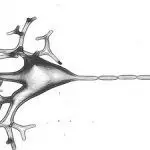Dendrite refers to the 'Trees' in Greek, so these are the branched small extension of the nerve cell. Axon refers to the 'axis' in Greek, so axon is the long slender like protrusion of the neuron or nerve cell. Secondly, dendrite receives messages or information or electrochemical impulses from the external environment or other neurons, so they work as the input for the … [Read more...] about Difference Between Dendrite and Axon
Difference Between mRNA, tRNA and rRNA
mRNA has a linear structure having uracil base instead of thymine, and its secondary structure could be hairpin, stem-loop, etc. ; while tRNA has Cloverleaf structure that carries three specific stem-loops; and rRNA has much complex structure with numerous folds and loops. mRNA acts as the messenger of DNA; tRNA carries amino acids during protein synthesis; rRNA is the … [Read more...] about Difference Between mRNA, tRNA and rRNA
Difference Between Bohr and Rutherford’s Atomic Models
Niels Bohr postulates the atomic model which states that electrons move in specific circular orbits around the nucleus with quantized kinetic and potential energies. Ernest Rutherford said that an atom consists of the whole mass that is concentrated into the center. From the above statement, we can say that both the models of the atom differ in the way they explained the … [Read more...] about Difference Between Bohr and Rutherford’s Atomic Models
Difference Between Green and White Revolution
The Green Revolution is the programme started in India and other developing countries to increase the production of wheat and rice and become self-sufficient. On the other hand, White Revolution or Operation Flood is an association with the objective of increasing milk production in India. Let's get back to history, the Third Agricultural Revolution or the Green Revolution … [Read more...] about Difference Between Green and White Revolution
Difference Between Mutualism, Commensalism and Parasitism
When both the partners or organisms get benefits from one another by living together is known mutualism. When only one partner or organism gets benefits without any effect on the other is commensalism. When one partner or organism gets benefits while the other is harmed is known as parasitism. Mutualism, Commensalism and Parasitism are the kinds of symbiosis relationship or … [Read more...] about Difference Between Mutualism, Commensalism and Parasitism





